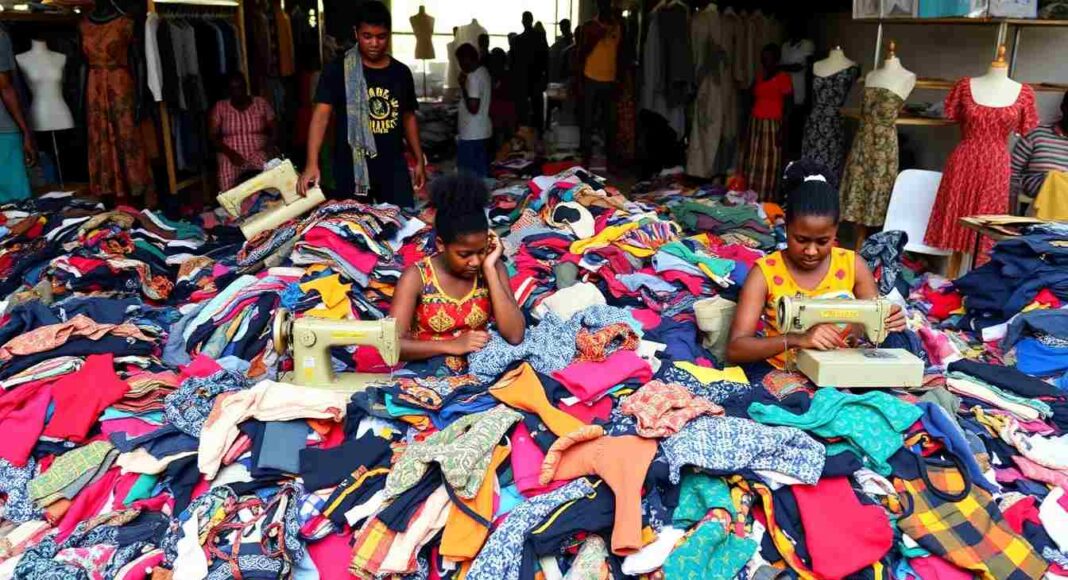Recent investigations have spotlighted a growing environmental crisis resulting from the UK’s fast fashion industry, particularly highlighting the alarming situation in Ghana. Reports reveal that vast quantities of discarded clothing from popular UK brands are being found in protected wetlands and beaches across Ghana, signaling a dire need for systemic change in how the fashion industry manages its waste.
A Rising Tide of Textile Waste
Ghana, known for its vibrant secondhand clothing market, receives an estimated 15 million items of used clothing weekly. However, a significant portion of these garments is of poor quality, with about 40% ending up as waste upon arrival. This influx has turned Ghana into one of the world’s largest dumping grounds for textile waste, leading to severe environmental degradation.
Local communities, particularly those relying on fishing and agriculture, are experiencing the fallout. Many report that their fishing nets are clogged with synthetic garments, and the waterways are becoming increasingly polluted. This situation has raised pressing questions about corporate responsibility and the sustainability of the fast fashion model.
The Impact of Fast Fashion
Fast fashion brands, such as H&M, Zara, and Primark, have been identified as key players in the textile waste crisis. Their business models, often centered on rapid production and disposal, contribute significantly to the waste problem. Clothes that are deemed unsellable are frequently dumped rather than recycled, exacerbating landfill issues in vulnerable areas.
In particular, recent findings from an investigation by Unearthed and Greenpeace Africa unveiled that items from major UK retailers, including Marks & Spencer and Next, were discovered dumped in protected wetlands that are home to endangered species. These covert dumping practices highlight the urgent need for Extended Producer Responsibility (EPR) policies, which would place the onus of waste management back on the manufacturers.
The Case for EPR
Extended Producer Responsibility is a policy approach that requires manufacturers to be accountable for their products throughout their lifecycle, including after consumer use. Implementing EPR in the fashion industry could incentivize brands to design for longevity and recyclability, thereby reducing the overall volume of waste generated.
Advocates argue that EPR could significantly mitigate the environmental impact of fast fashion. By holding corporations responsible for the disposal of discarded clothing, brands would be encouraged to develop sustainable practices and engage in more ethical production methods.
Local Voices and The Fight for Change
Local traders and environmentalists in Ghana are increasingly vocal about the need for change. Many express frustration over the quality of clothing being dumped and the impact it has on their livelihoods. For instance, traders at Kantamanto, one of the world’s largest secondhand markets, report that the quality of clothing arriving from the West has deteriorated over the years, with more garments being unsuitable for resale.
The Or Foundation, an organization dedicated to combating textile waste and promoting sustainability, has been at the forefront of this movement. Their campaigns aim to raise awareness and push for policy changes that would hold international brands accountable for their waste.
Conclusion: A Collective Responsibility
The situation in Ghana serves as a stark reminder of the consequences of fast fashion and the urgent need for reform in the industry. As the global textile waste crisis deepens, it is imperative that both consumers and manufacturers acknowledge their roles and responsibilities. Implementing EPR policies could pave the way for a more sustainable fashion industry, prioritizing the health of communities and the environment over profit margins.
Without meaningful change, the cycle of waste will continue, leaving vulnerable communities to bear the brunt of the consequences. It is time for the fashion industry to take a stand and commit to a more sustainable and responsible future.

































